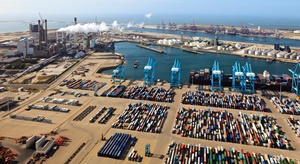Ports set to become increasingly environmentally friendly
22 Dec 2011
An environmentally friendly port can also be more efficient. One particularly promising measure involves offering a discount on port dues to more environmentally friendly ships, says Vellinga, who is also affiliated with the Rotterdam Port Authority.

In its Port Vision 2030 (Havenvisie 2030), the Rotterdam Port Authority puts forward its aim to become the world's most sustainable port and the most efficient link in the chain to the European hinterland. Prof. Tiedo Vellinga is convinced that efficiency and sustainability can be combined very successfully.
"A key factor in the process is that companies that lead the way in terms of sustainability act as the frontrunners. Environmentally friendly ships, or those that are more environmentally friendly than the law demands will, for example, be given a discount on port dues by the port administrator. The government will need to support this kind of initiative and ultimately back it up with appropriate legislation and regulations. There can be rewards for frontrunners in the early stages, but ultimately those that lag behind will need to be punished. This can be achieved by outlawing certain things or making them financially unattractive."
"Financiers will need to understand the role of the port administrators and develop special green packages. Some time ago, I spoke to some people at a major bank in Rotterdam who were considering providing loans on more favourable terms to companies with a higher environmental score. In their experience, as in mine, these kinds of frontrunners are often better organised across the board, and tend to think ahead, making them more creditworthy. Sustainability does not necessarily have to be expensive – on the contrary."
"The World Port Climate Initiative is a highly promising international development. It is an initiative of a number of ports from around the world, including Rotterdam. One of its key projects is the Environmental Ship Index (ESI), which can be used to distinguish between maritime ships in terms of their environmental performance. Its aim is to provide incentives in this area, for example by offering a discount on port dues", says Vellinga, who has been affiliated with the Rotterdam Port Authority for more than 30 years.
"This discount on port dues is a form of capital-intensive investment that will pay for itself in the longer term. The Rotterdam Port Authority aims to bring about changes in behaviour, which will enable it to generate more business at a later stage within the environmental constraints that apply to it as a port. It also means that the Port Authority can save on expensive environmental provisions, such as shore power facilities or compensation for the damage caused by emissions from maritime shipping.
After all, if ships are more environmentally friendly, it is possible to accommodate greater numbers of ships within the ever-increasing environmental constraints that apply. This is why, starting this year, the 25 most environmentally friendly ships in Rotterdam will receive a 10 per cent discount on gross port dues every time they visit the port.''
This not only applies to Rotterdam: the ports of Hamburg, Antwerp, Oslo and Amsterdam also offer discounts to the most environmentally-friendly ships. Next year will see the port of Los Angeles join the scheme as well.
According to Vellinga, the fact that sustainability is perfectly achievable in the port has already been proven in the past.
"A great deal of progress has been made that seemed impossible at the outset; just think of the significant reductions in damaging discharges into the Rhine starting in the 1980s and the development of the major civil engineering project Maasvlakte 2. The Port Authority stipulated that Maasvlakte 2 should be a sustainable expansion from the very start and remained true to its word. The requirements in terms of sustainability have been translated into contractual conditions, which are also subject to monitoring."
"The major Maasvlakte 2 project is also unusual because of the involvement of stakeholders, ie the interest groups affected by the project. This marked an important break with the past for the Port Authority. Looking back at the headlines that appeared at the start, it seemed at the time to be an impossible task. But with hindsight, those were the early stages of an extremely positive movement that is showing signs of increasing momentum."


















